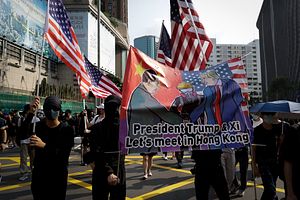The small river bends southward,
Flow to Hong Kong to have a look.
Pearl of the Orient, my love,
Is your demeanor still the same?
……
The sea wind has blown for five thousand years,
Each tear tells about your dignity.
Let the sea tides accompany me to bless you,
Don’t forget my never-changing yellow face.
These are part of the lyrics of the popular “Pearl of the Orient” by Lo Da-yu, a well-recognized singer and songwriter who was born in Taipei. With its poetic lyrics and sentimental melody, “Pearl of the Orient” touched the hearts of several generations of people in Greater China. Though there was an earlier version, this song was particularly rewritten in 1991 in the context of Hong Kong’s upcoming return to China.Lo Da-yu expressed his affectionate wishes and expectations for a better future in Hong Kong and emotionally revealed a sense of connection to the Chinese nation – the reference to “my never-changing yellow face.” In 1997, when Hong Kong was turned over to China, two famous singers, Andy Lau from Hong Kong and Na Ying from mainland China, performed this song together to commemorate that historic moment.
For years, this song has always reverberated with the unique feelings of several generations of Chinese people toward Hong Kong, which imagined the city as a shining “Pearl of the Orient” that connects Mainland China with the world.
Besides Hong Kong’s almost unparalleled charm in popular culture among young people in mainland China, especially in the 1980s and 1990s, Hong Kong, as an international financial center, has played an indispensably important role in China’s opening and reform during the past decades. In the earlier years of the economic growth of mainland China and especially the Guangdong area, capital and technology imported from Hong Kong supported and facilitated the once prevalent “Front Shop and Back Factory” system, an economic cooperation model that not only helped realize Hong Kong’s economic transformation and industrial transfer, but also significantly helped boost economic growth in the coastal mainland provinces. This, in return, consolidated and strengthened Hong Kong’s position in China’s international entrepot trade.
After the 1997 handover, Hong Kong’s unique political system, social structure, and role as a regional hub for international trade, logistics, and finance have all remained. The astounding economic growth of mainland provinces and big cities like Shanghai and Shenzhen did raise worries and questions about Hong Kong’s longstanding role as a hub for China’s outbound economic activities. But this definitely does not mean doom for Hong Kong. The city still enjoys a number of advantages such as its important role in international logistics and transportation, its attractiveness for international trade and finance, its professional experience in international legal issues, and its well-structured high-level educational system. In the meantime, the construction of Guangdong-Hong Kong-Macao Greater Bay Area as one of China’s most highlighted national development strategies has particularly reaffirmed Hong Kong’s unique role in China’s further development.
However, the recent social disturbances in Hong Kong, especially since the spring and summer of 2019, have called this future into question. The special administrative region of China has played an important role in China’s overall economic rise, and its prosperity and stability are just too precious to be sacrificed. Of particular note are the bewilderingly compassionate and supportive attitudes by Western media and politicians toward the violent demonstrations that jeopardize the economic growth and social stability of Hong Kong. We must face a bitter fact: a new rift between China and the West, and especially the United States, is being torn in Hong Kong.
Unfortunately, what’s happening in Hong Kong is both critical and extremely complicated, and has gone far beyond the original legal question of how to extradite criminal offenders. The situation has evolved in an increasingly violent way, yet the U.S. House speaker, Nancy Pelosi, called it “a beautiful sight to behold.” More recently, the U.S. Congress passed the Hong Kong Human Rights and Democracy Act of 2019, a bill that “addresses Hong Kong’s status under U.S. law and imposes sanctions on those responsible for human rights violations in Hong Kong.”
To many in China, this act has some obvious hidden motives. Currently, Washington seems to be gradually falling into a kind of political fanaticism in its quest to implement a “whole-of-government” pushback against China using all possible means. Advocating for strategic competition and confrontation with China is now a new form of “political correctness.” Is the United States attempting to “short-circuit” Hong Kong as part of this “whole-of-government” approach, especially at a time when the central government of China had decided at the national strategic level to help to reinvigorate Hong Kong’s economy?
At least, one thing is clear: it is in Hong Kong’s best interest to remain as a “Pearl of the Orient” rather than a playground for Washington to practice its all-around pushback against China. In a speech given at the Woodrow Wilson International Center in Washington, D.C. on October 24, U.S. Vice President Mike Pence claimed that the United States does not seek to “decouple” from China and does not seek “confrontation” with China. If this is what Washington truly means, don’t let a new rift between China and the United States be torn in Hong Kong.
































